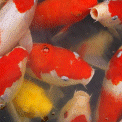Fish health and water quality
...the basis of disease prevention

Fish-keepers should not underestimate the importance of water quality to the well-being of their fish. As beginners we are told "look after the water and the fish will look after themselves" or "fish keeping is all about water-keeping". These statements sound grand but what do they mean?
Water quality not clarity
Fish-keepers know that water quality is one of the most important aspects of fish health. The problems arise from our interpretation of what that means. Some fish-keepers believe that water quality simply means water clarity'. But clarity often has little to do with quality. Indeed our idea of what constitutes good water can be very different to what is ideal for fish! So let me come right out and say it is not possible to tell good water by just looking - although some fish-keepers believe they can.
 Consider a mountain stream. Often such streams near their source can be crystal-clear but devoid of life. Further downstream the water can be green and often muddy - yet such waters are usually highly productive and teeming with all forms of aquatic life. So, in natural conditions the clearest water is not always best for aquatic life. However, it is possible to have good quality water that is also clear. Consider a mountain stream. Often such streams near their source can be crystal-clear but devoid of life. Further downstream the water can be green and often muddy - yet such waters are usually highly productive and teeming with all forms of aquatic life. So, in natural conditions the clearest water is not always best for aquatic life. However, it is possible to have good quality water that is also clear.
Why is water so important?
Understanding the importance of water to fish requires some understanding of water chemistry and of the way in which different water conditions affect the health and well being of fish. It is often difficult for terrestrial animals such as ourselves to understand how crucial the relationship is between fish and their watery environment. It is only when we understand this relationship that the importance of water quality' (or water chemistry) becomes clear.
Fish are 90% water living in a watery environment - and they are not isolated from the water that surrounds them. They have to be open systems to allow for the exchange of substances between themselves and the water; substances such as oxygen, carbon dioxide, salts and wastes. All that separates the fluid inside a fish's body from the water that surrounds it is a thin membrane. This membrane is semi-permeable (meaning that some substances may pass through it but not others) and allows an exchange of substances between the body fluids and the surrounding water. When fluids are in close contact they tend to mix together to form a uniform mixture (like milk in your tea). Therefore, changes in the nature of the surrounding water will have an effect on the body fluids of the fish.
 Fish have evolved over millions of years in fairly stable conditions. Therefore, in a natural environment, they do not need to adapt to rapid or large fluctuations in the conditions of their surroundings. However, in an enclosed system, such as a fish-pond, conditions can change rapidly, leading to stressed fish. Fish have evolved over millions of years in fairly stable conditions. Therefore, in a natural environment, they do not need to adapt to rapid or large fluctuations in the conditions of their surroundings. However, in an enclosed system, such as a fish-pond, conditions can change rapidly, leading to stressed fish.
Consider temperature, for example. In an open body of water the temperature may vary between 0oC and 25oC but this would normally occur over a twelve-month period. Contrarily, for a land-based animal, such a temperature change could occur over a period of hours without causing distress. Whilst fish can adapt to changes in environmental conditions their ability to do so is limited and usually restricted to a narrow range. Rapid or large shifts outside their normal range can cause health problems or, in the extreme, even death.
To appreciate the full extent of the relationship between fish and the water they live in we need to  understand some basic chemistry and a few important properties of water, and how variations in water conditions (physical, chemical or biological) can affect the body functions of fish. Water is the most common substance on earth, covering 70% of the planets surface. Plants and animals are mostly water - even the Archbishop of Canterbury, is 65% water! Because of this abundance we often take it for granted and overlook what a remarkable substance it is. Water is a major part of all biological systems and there is almost no activity of a living organism that can take place without it. understand some basic chemistry and a few important properties of water, and how variations in water conditions (physical, chemical or biological) can affect the body functions of fish. Water is the most common substance on earth, covering 70% of the planets surface. Plants and animals are mostly water - even the Archbishop of Canterbury, is 65% water! Because of this abundance we often take it for granted and overlook what a remarkable substance it is. Water is a major part of all biological systems and there is almost no activity of a living organism that can take place without it.
|




 understand some basic chemistry and a few important properties of water, and how variations in water conditions (physical, chemical or biological) can affect the body functions of fish. Water is the most common substance on earth, covering 70% of the planets surface. Plants and animals are mostly water - even the Archbishop of Canterbury, is 65% water! Because of this abundance we often take it for granted and overlook what a remarkable substance it is. Water is a major part of all biological systems and there is almost no activity of a living organism that can take place without it.
understand some basic chemistry and a few important properties of water, and how variations in water conditions (physical, chemical or biological) can affect the body functions of fish. Water is the most common substance on earth, covering 70% of the planets surface. Plants and animals are mostly water - even the Archbishop of Canterbury, is 65% water! Because of this abundance we often take it for granted and overlook what a remarkable substance it is. Water is a major part of all biological systems and there is almost no activity of a living organism that can take place without it.
